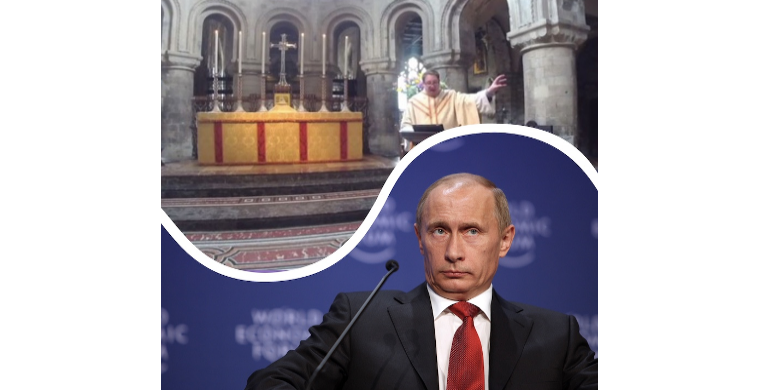Church of England Priest Denounces Putin's False 'Christian Orthodox' Faith
By Collin Bastian
www.juicyecumenism.com
March 9, 2022
Russian President Vladimir Putin's military offensive against Ukraine has resulted in horrendous amounts of destruction and loss of life. Russia's military estimates that it has lost 498 soldiers while taking the lives of 2,800 of Ukrainian troops; Ukraine, meanwhile, suggests that 5,800 Russians have died, while it has declined to note how many casualties its forces have suffered.
When such astounding carnage takes place between two supposedly Christian nations, it is important that Christian leaders have a powerful and decisive message to deliver, one that does more than just condemn unnecessary violence and death, as the officials of some denominations have offered in the preceding weeks.
Church of England officials have delivered strong statements regarding the invasion of Ukraine. At the outset of the war, Archbishop of Canterbury Justin Welby and Archbishop of York Stephen Cottrell released a joint statement condemning Putin, calling his attack "an act of great evil."
Among the strongest denunciations of Putin's actions was a sermon delivered by Fr. Marcus Walker on February 27 at St. Bartholomew the Great, the oldest parish church in London and the site of several sermons delivered by John Wesley. Walker, the Rector of Great St. Bart's and a leading Church of England clergyman, made clear that the Russian forces were the unjust aggressors, remarking that "Vladimir Putin resolved to unleash hell on his neighbor."
Walker began his homily by reciting W. H. Auden's poem, Epitaph on a Tyrant, and drew comparisons between Putin and the tyrant in Auden's poem, illustrating the similarity between the last line of the poem, "and when he cried, the little children died in the streets," and the reported bombing of a Ukrainian kindergarten by Russian forces.
Walker's invective against Putin was unabashed.
"A Christian Orthodox leader has unleashed unimaginable death and destruction upon a Christian Orthodox nation," Walker declared. "He has seen the Gospel of peace and heard the words of love given to us and given to him by our God, and he has kissed the icons of the mother holding her child, and he has decided to trample untold numbers of children into the frost and mud of Ukraine and see how many mothers weep at the sight of their dead children."
But Walker, who spent part of his childhood in Moscow, gave his congregation more than the necessary denunciation of Putin. Turning away from his focus on Russia, he expressed his admiration for the Ukrainian forces, emphasizing the way in which they have treated captured Russian forces, giving them "a telephone to call their mothers and tell them that they are still alive."
The contrast between the two countries could hardly be starker.
"One Christian nation reminds us," Walker said, "that loving the Prince of Peace does not incline us naturally towards peace ourselves. Another Christian nation has reminded us of the words of that Prince of Peace: love your enemies, bless them that curse you, do good to them that hate you, and pray for them which spitefully use you and persecute you."
"This," he continued, "is what it means to love your neighbor as yourself." The way of the world, to "love your friends and hate your enemies, that is what leads us to kindergartens being bombed and cruise missiles being fired into tower blocks."
Still, Walker warned, "this does not mean you do not have enemies. The men sent over the borders from Russia and White Russia are the enemies of the people of Ukraine." But importantly, he did not think this was sufficient to comprise a full picture of the Russian soldiers. "They are enemies and must be fought as such, and will, please God, be beaten. But they are still human. And in the face of the young conscripts, we see the face of Christ."
Walker concluded his homily by reflecting on fallen humanity. "This war has reminded us that man's inhumanity to man is never far from being unleashed, that our basest instincts are there for us to feed. But it has also reminded us that to feed them is a choice, and that we can say no."
Despite our tendency to easily slip into fallenness, Walker reassured his congregation that "there is light in the darkness this morning." That light, he contended, did not merely "come from the survival of a free people in free cities," but instead was "coming from the way those free people have heard the message of their Savior, and have proved themselves by their actions to be...children of their Father, which is in heaven."
May we all have the courage and clarity of Walker in this present moment to properly assess the threat and what our solutions ought to be. As the world rallies around Ukraine and continues to denounce Russia and Putin through various economic punishments, it is worth pondering how we can best show the love of God to all involved in the conflict: to our Ukrainian friends, obviously, but also to our apparent Russian enemies. For while it is good and noble to hope for Putin's defeat, we need also to consider how Russia and her people may be reconciled to the global Christian community.














